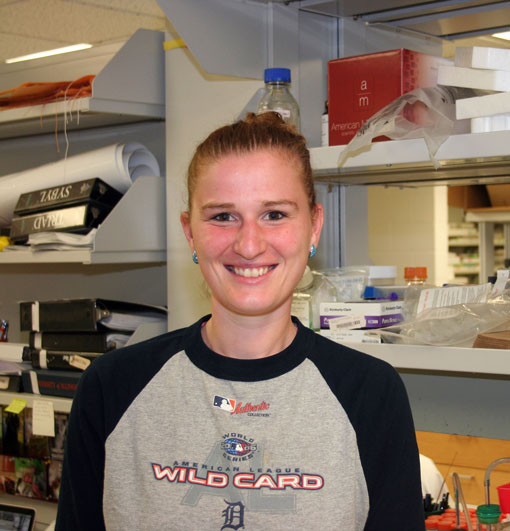
Diabetes and obesity can create cellular stress on our kidneys. When the body fails to regulate this stress, fat accumulates in the kidney and chronic disease could result.
What mechanisms do our bodies employ to reduce systemic stress and maintain normal kidney function?
Diane McCabe, a postdoctoral researcher in anatomy and cell biology at the University of Iowa, studies the role of ATF6 in stress response and regulation of metabolism leading to fatty kidney.
In the lab, McCabe works with mice that lack ATF6. Within 48 hours of injecting these mice with a known stressor, the mice develop completely fatty kidneys. The fat accumulation in the kidney does not allow the organ to function properly and may cause hypertension.
“I believe the absence of ATF6 is affecting factors involved in fatty acid metabolism,” says McCabe, whose research is ongoing. “The pathways that are normally involved in breaking down fats or transferring fats out of the kidney are no longer working.”
CHOP and cellular stress
In addition to researching fatty kidney, McCabe is assisting in her laboratory’s examination of the protein CHOP and its role in promoting liver cancer in mice.
CHOP is a transcription factor that is produced when cells experience certain kinds of stress. It is known to promote cell death. Usually, factors that promote cell death guard against cancer by causing damaged cells to die. However, McCabe and her colleagues are examining data suggesting that CHOP does not follow the usual pattern.
McCabe contributed to a UI study showing that despite its role in cell death, CHOP is elevated in liver tumor cells in mice. Also, mice without CHOP are partially protected from liver cancer, developing fewer and smaller tumors than the normal mice when exposed to drugs that cause liver cancer.
The study was published last December in the journal PLOS Genetics. Thomas Rutkowski, assistant professor of anatomy and cell biology and McCabe’s supervisor, is the senior study author.
“We plan to continue this research from where the paper left off and find out when in the process CHOP becomes involved,” McCabe says. “We will make transgenic mice in which we can turn CHOP expression on at different points and to different degrees. We can look at this process on a time course.”
Changing research paths
A native of Kalamazoo, Mich., McCabe entered a new area of research when she joined Rutkowski’s anatomy and cell biology lab. She earned her Ph.D. in biochemistry at the University of Illinois.
“As a doctoral student, I worked with chaperone proteins and cellular stress response, so there was some commonality. But this was a huge change,” McCabe says. “I started from square one to do all the back reading and wrap my mind around this field. I needed to learn how the cellular stress response works and the various factors that are involved.”
McCabe proved to be a quick learner, aided by a good mentor.
“Prof. Rutkowski is expert in the cellular stress response. He’s taught me how to build a project from the ground up,” McCabe says. “He’s helped me conceptualize things and look to the future and think about what experiments I need to do to go from Point A to Point B. At the end of the day, I will have a lot of tools in my toolbox as far as techniques.”